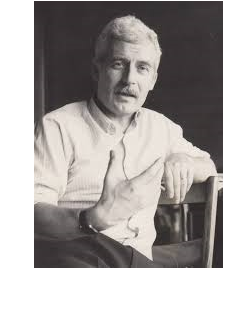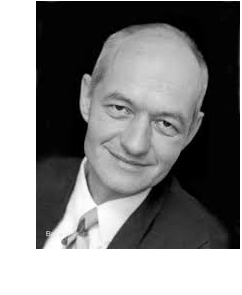
Alfred Hoffmann worked as a professor of Chinese language and literature at the Ruhr University in Bochum from 1964 to 1976 and, as the first holder of the chair, made a significant contribution to the establishment of what was then still called the Institute of East Asian Studies and the specialist library.
Hoffmann was born on March 28, 1911 in Eschweiler near Aachen. From 1929 onwards, he studied philology at the Friedrich Wilhelm University (i.e. today's Humboldt University in Berlin) and at the Seminar for Oriental Languages in Berlin, focusing on the Chinese language. As early as 1931, he passed his examination as a certified interpreter. He then studied and worked at the Seminar for Chinese Language and Culture at the University of Hamburg, where he became friends with the sinologist Wolfgang Franke, who attested to his "absolute linguistic talent" and great interest in contemporary Chinese literature. After his oral doctoral examination in sinology, Hoffmann was drafted into service in the Wehrmacht in 1940, and then in the same year, with the support of Otto Franke, was sent as an assistant to the German Institute in Beijing. From 1943 to 1945, Hoffmann went to the German Embassy in Nanjing of the Wang Jingwei (汪精衛) government, where he also taught courses at the university. After the collapse of the regime, he returned to Beijing, from where he was then forcibly repatriated the following year and returned to Germany.
After 1947, he finished his dissertation on Die Lieddichtung des Li Yü (937-978) and received his doctorate in 1949 in Hamburg under Fritz Jäger; he submitted this dissertation in extended form in 1952 to the Philipps University in Marburg, where he was awarded the venia legendi for the subject of Sinology in the same year. He then worked there for two years as a lecturer before taking on a Diätendozentur and finally being appointed an associate professor in 1957. From 1961 to 1964 he worked as a full professor at the Free University of Berlin and at the same time as the director of the East Asian Seminar there. In the summer semester of 1964, he left Berlin to take up a professorship in Chinese language and literature at the Ruhr University in Bochum. At that time, the newly founded institute consisted of Hoffmann, one assistant, one research assistant, and one lecturer each for Chinese and Japanese (for the development and expansion of Japanese Studies). Until his retirement in 1976, Alfred Hoffmann played a decisive role in building up the institute and, above all, in equipping the specialized library, where the source materials he collected still bear witness to his extensive knowledge of Sinology. In honor of his retirement in 1976, his students Wolfgang Kubin, Peter Leimbigler and Hans Link published a commemorative publication.
Not only the Section for Chinese Language and Literature, but also Sinology owes numerous achievements to Alfred Hoffmann, who passed away in Bochum in 1997: Especially in his younger years, Hoffmann had focused on modern China, drawing attention in particular and as one of the first to the importance of the literary revolution in China with his translation of relevant writings by Hu Shi 胡適 (1891-1962). He also contributed to this through his first translations of colloquial narratives by authors such as Bingxin 冰心 (1900-1999), Zhu Ziqing 朱自清 (1898-1948), and Lu Xun 魯迅 (1881-1936). Equally significant was A Ying 阿英's (1900-1977) presentation of the literary history of the late Qing period, which he translated in 1939. Later Hoffmann turned to ancient China, making an important contribution to the translation and interpretation of ci poetry, including his monograph Die Lieder des Li Yü (937-978) (Cologne: Greven, 1950). Another of Hoffmann's interests was ornithology: in this field, he is credited with the 1975 Glossary of Chinese Bird Names in Use Today (Wiesbaden: Harrassowitz, 1975). Apart from Hoffmann's sinological achievements, however, Kubin described him above all as an "outstanding teacher" who was able to inspire his students with his vast fund of knowledge about China and at the same time made high demands on them and on himself: "You were constantly challenged by him and thus finished your studies within a short time.
Die Lieddichtung des Li Yü (937–978) [1950]
Frühlingsblüten und Herbstmond [1951]
Glossar der heute gültigen chinesischen Vogelnamen [1975]
Neue chinesische Vogelnamen [1978]

Helmut Martin served as the second chair after Alfred Hoffmann (1911-1997) in the Section of Chinese Language and Literature at the Ruhr University in Bochum from 1979 to 1999. We owe the opening of the subject to modern China and Taiwan to his interest and work in the area of scientific history. Furthermore, Martin represents the co-founding of the Sinicum at the North Rhine-Westphalian State Language Institute (1980) and the Richard Wilhelm Translation Center at the Ruhr University Bochum (1993).
Martin was born in Kassel on March 5, 1940. After graduating from high school in 1959, he studied sinology and Slavic studies in Munich, Belgrade, Paris, and Heidelberg. In 1966 he received his doctorate with the publication of his Heidelberg dissertation Li Liweng on Theater (later published as Li Liweng lun xiju 李立翁論戲劇, Taibei: Mei Ya Publications, 1968), became an assistant at the Sinological Seminar in Heidelberg in 1966, and went to Taiwan for three years by means of a scholarship for further research on Li Yu. There the sinologist met his wife Tienchi Martin-Liao (廖天琪), with whom he returned to Germany in the early 1970s. From 1972 to 1979, Helmut Martin worked as a research associate at the Institute of Asian Studies with responsibility for the domestic politics of the People's Republic of China. During this period he supervised numerous academic projects, including the publication of the magazine China aktuell (1972), the Langenscheidt Dictionary of Chinese-German Vocabulary (1977), and the translation and publication of all of Mao Zedong's writings in six volumes (1979-1982). In 1979 he was appointed to the chair of Chinese language and literature, succeeding Alfred Hoffmann (1911-1997). In addition to activities as a visiting professor in East Asia and the USA, Helmut Martin was for many years chairman of the German Association for Chinese Studies (DVCS).
Helmut Martin not only supported research into native literature, which had long been taboo in Taiwan, and the work of GDR sinology, but also cultivated contacts with Chinese writers and intellectuals who were living in social distress because of their oppositional views. He was scientifically critical of the Chinese government, which he openly expressed in publications, lectures, and demonstrations. Martin's public-political concerns and his passion for the history of science made him, together with his wife Tienchi Martin-Liao, probably the most important promoter of the Chinese democracy movement on the mainland as well as on Taiwan in the ranks of German sinology. Helmut Martin must be credited with a significant contribution to the advancement and study of modern Chinese literature. His publications are among the most important German-language sources on the political-intellectual culture of contemporary China and have increased interest in the study of modern China within West German sinology. The Richard Wilhelm Translation Center, which he founded and which complements linguistic and literary research at the Ruhr University, also represents a significant step in opening up the discipline to modern China.
Helmut Martin died on June 8, 1999, at the age of 59. His work in research and his political commitment can be measured by the numerous obituaries dedicated to him after his death.

Raoul David Findeisen was born in Saignelégier, Switzerland in 1958 and studied Sinology, Japanese Studies, Romance Studies, Comparative Literature and Philosophy in Berlin, Taipei, Beijing and Bonn. In 1988-1989 he first worked as a translator in Beijing and in 1990-1992 in the pharmaceutical industry in Basel. From 1993 to 1999 Findeisen worked as a senior lecturer at the University of Zurich and in tandem as a high school teacher of Chinese. Various research stays took him to Lyon, Bratislava, Shanghai and Beijing. Over time, he held teaching positions at the universities of Berlin (FU), Basel, Warsaw, Geneva, Jerusalem, and Prague. He was appointed to the Bochum Chair of Chinese Language and Literature in the winter semester of 1999/2000, first as a substitute and then as a professor in 2001. From 2004 to 2008, he was also Dean of the Faculty of East Asian Studies. In 2009, he left Bochum to work at Comenius University in Bratislava as a professor of Modern Chinese Literature. At the same time, he gave numerous guest lectures at the Institute of East Asian Studies at the University of Vienna. He also served as a visiting professor at Sichuan University in Chengdu. Findeisen served on the boards of the European Association of Chinese Studies (1996-2002) and the German Association for China Studies (1999-2005). In the last years of his life, he devoted himself mainly to the promotion of Sinology in Slovakia and worked as editor of the journal Studia Orientalia Slovaca before his death in 2017.
Findeisen was considered an expert on Lu Xun 魯迅 (1881-1936), on whom he wrote his doctoral dissertation and edited the volume Lu Xun. Texte, Chronik, Bilder, Dokumente (Frankfurt am Main: Stroemfeld, 2001). His research interests were primarily in Chinese literature of the republican period and, relatedly, in the sociology of literature, comparative literature, and translation theory and history. In the field of textology, he was concerned with the analysis of manuscripts from the republican period, and with regard to the latter field of research, he advocated a better exchange between Chinese and Western manuscript research. His Chinese colleague Wang He 王賀 called him the "backbone of European sinology" and a "model scholar of modern Chinese literary studies" and saw his death as a great loss for sinological research.
Henning Klöter held the chair of the Chinese Language and Literature section between 2009 and 2012. His research interests focus on socio-, missionary- and colonial linguistics. In addition, Klöter is actively engaged in Taiwan and Sinophone literature.
Henning Klöter completed his studies in Sinology, German Studies and Political Science at the Universities of Trier and Leiden as well as at the National Taiwan University and the Capital Normal University in Beijing. After working as a translator and editor in Taipei for two years (1997-1999), he received his doctorate in 2003 with a dissertation on Written Taiwanese (Wiesbaden: Harrassowitz, 2005). Between 2003 and 2005, Klöter worked as a lecturer and research assistant at the Ruhr University in Bochum. He then served as a postdoctoral fellow at Leiden University (2005-2007) and assistant professor at National Taiwan Normal University (2007-2009). During his substitute professorship at Ruhr-Universität Bochum, Henning Klöter completed his habilitation in 2010 on The Language of the Sangleys: A Chinese Vernacular in Missionary Sources of the 17th Century (Leiden: Brill, 2011). Subsequently, Klöter taught as a professor of Chinese (translation, linguistics, and cultural studies) and Chinese didactics at the Johannes Gutenberg University in Mainz (2012-2013) and then at the Georg August University in Göttingen (2013-2015). Since 2015, he has been researching and teaching at the Institute of Asian and African Studies at Humboldt-Universität zu Berlin and has served as director of said institute since October 2018. Henning Klöter was also editor of the Taiwan Research Unit's Studia Formosiana (2003-2015) and has been in charge of the Sinolinguistica series (published since 1991) since 2013.
Rüdiger Breuer substituted for the Chair of Chinese Language and Literature at Ruhr-Universität Bochum between 2012 and 2016. His research focuses on colloquial narrative literature from the Song to the Qing period, the relationship between orality and writing in Chinese literature, performing literary genres such as theater, and more recently on the work of contemporary Chinese authors Mo Yan 莫言, Yu Hua 余华, and Yan Lianke 阎连科.
Rüdiger Breuer received his Master's degree in 1995 in Chinese Language and Literature, Japanese Language and Literature, and Economics in Bochum and Taipei. After six years of doctoral studies in Chinese and comparative literature at Washington University in Saint Louis, USA, (1995-2001), he received his PhD with a dissertation on Early Chinese Vernacular Literature and the Oral-Literary Continuum. During this period he taught at Washington University and the University of Missouri in Saint Louis. Rüdiger Breuer has worked at the Ruhr University since April 2002, initially as a lecturer in Chinese, and since October 2002 as a research associate, and was appointed Dean of the Faculty of East Asian Studies in 2011. He has served on the boards of the European Association of Chinese Studies (2012-2016) and the German Association for China Studies (2005-2011, 2013-2019). In addition, he is the editorial director of the Bochum Yearbook of East Asian Studies (BJOAF), which has been published by the faculty in uninterrupted succession since 1978.